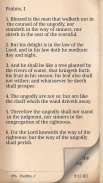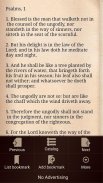





Bible - Psalms

وصف لـBible - Psalms
Psalms
The Book of Psalms (Hebrew: תְּהִלִּים or תהילים Tehillim meaning "Praises"), commonly referred to simply as Psalms or "the Psalms", is the first book of the Ketuvim ("Writings"), the third section of the Hebrew Bible. The English title is from the Greek translation, ψαλμοί psalmoi, meaning "instrumental music" and, by extension, "the words accompanying the music." There are 150 psalms in the Jewish and Western Christian tradition (more in the Eastern Christian churches), many of them linked to the name of King David, but his authorship is not accepted by most modern Bible scholars.
Benedictions and superscriptions
The Book of Psalms is divided into five sections, each closing with a doxology (i.e., a benediction) – these divisions were probably introduced by the final editors to imitate the five-fold division of the Torah:
Book 1 (Psalms 1–41)
Book 2 (Psalms 42–72)
Book 3 (Psalms 73–89)
Book 4 (Psalms 90–106)
Book 5 (Psalms 107–150)
Many psalms (116 of the 150) have individual superscriptions (titles), ranging from lengthy comments to a single word. Over a third appear to be musical directions, addressed to the "leader" or "choirmaster," including such statements as "with stringed instruments" and "according to lilies." Others appear to be references to types of musical composition, such as "A psalm" and "Song," or directions regarding the occasion for using the psalm ("On the dedication of the temple," "For the memorial offering," etc.). Some carry the names of individuals, the most common being David, and thirteen of these relate explicitly to incidents in the king's life.
Overview
Individual psalms were originally hymns, to be used on various occasions and at various sacred sites; later, some were anthologised, and might have been understood within the various anthologies (e.g., ps.123 as one of the Psalms of Ascent); finally, individual psalms might be understood within the Psalter as a whole, either narrating the life of David or providing instruction like the Torah. In later Jewish and Christian tradition, the psalms have come to be used as prayers, either individual or communal, as traditional expressions of religious feeling.
المزامير
كتاب المزامير (العبرية: תְּהִלִּים أو תהילים Tehillim معنى "يشيد")، ويشار إليها اختصارا باسم المزامير أو "المزامير"، هو الكتاب الأول من أسفار الكتابات ("كتابات")، والقسم الثالث من الكتاب المقدس العبرية. عنوان اللغة الإنجليزية هي من الترجمة اليونانية، psalmoi ψαλμοί، ومعنى "الآلات الموسيقية"، وبالتالي "، والكلمات المصاحبة للموسيقى." هناك 150 المزامير في التقليد المسيحي اليهودي والغرب (أكثر في الكنائس المسيحية الشرقية)، وكثير منهم مرتبط إلى اسم الملك داود، ولكن لم يتم قبول تأليفه من قبل معظم علماء الكتاب المقدس الحديثة.
الادعيه وsuperscriptions
ينقسم كتاب المزامير إلى خمسة أقسام، كل مع اغلاق الحمدله (أي الدعاء) - وربما دخلت هذه الانقسامات من قبل المحررين النهائية لتقليد تقسيم خمسة أضعاف من التوراة:
الكتاب 1 (مزامير 1-41)
2 كتاب (مزامير 42-72)
كتاب 3 (مزامير 73-89)
الكتاب 4 (المزامير 90-106)
5 كتاب (مزامير 107-150)
العديد من المزامير (116 من 150) لديهم superscriptions الفردية (عناوين)، بدءا من تعليقات مطولة لكلمة واحدة. أكثر من ثلث تظهر أن الاتجاهات الموسيقية، موجهة إلى "الزعيم" أو "choirmaster،" بما في ذلك عبارات مثل "مع الآلات الوترية" و "وفقا لالزنابق." يبدو البعض الآخر بمثابة إشارات إلى أنواع التأليف الموسيقي، مثل "مزمور" و "كلمات"، أو الاتجاهات المتعلقة المناسبة لاستخدام المزمور ("على تفاني المعبد"، "لطرح النصب التذكاري"، وغيرها ). تحمل بعض أسماء الأفراد، وأكثرها شيوعا هي ديفيد، وثلاثة عشر من هذه الحوادث تتعلق صراحة في حياة الملك.
نظرة عامة
كانت المزامير الفردية تراتيل في الأصل، لاستخدامها في مناسبات مختلفة وعلى مختلف المواقع المقدسة؛ في وقت لاحق، تم anthologised بعض، وربما كان من المفهوم ضمن المختارات المختلفة (على سبيل المثال، ps.123 باعتبارها واحدة من مزامير الصعود)؛ أخيرا، قد يكون مفهوما المزامير الفردية داخل سفر المزامير ككل، إما سرد حياة ديفيد أو توفير التعليم مثل التوراة. في التقاليد اليهودية والمسيحية في وقت لاحق، قد تأتي المزامير لاستخدامها صلاة، سواء الفردية أو الجماعية، والتعبيرات التقليدية من الشعور الديني.
























